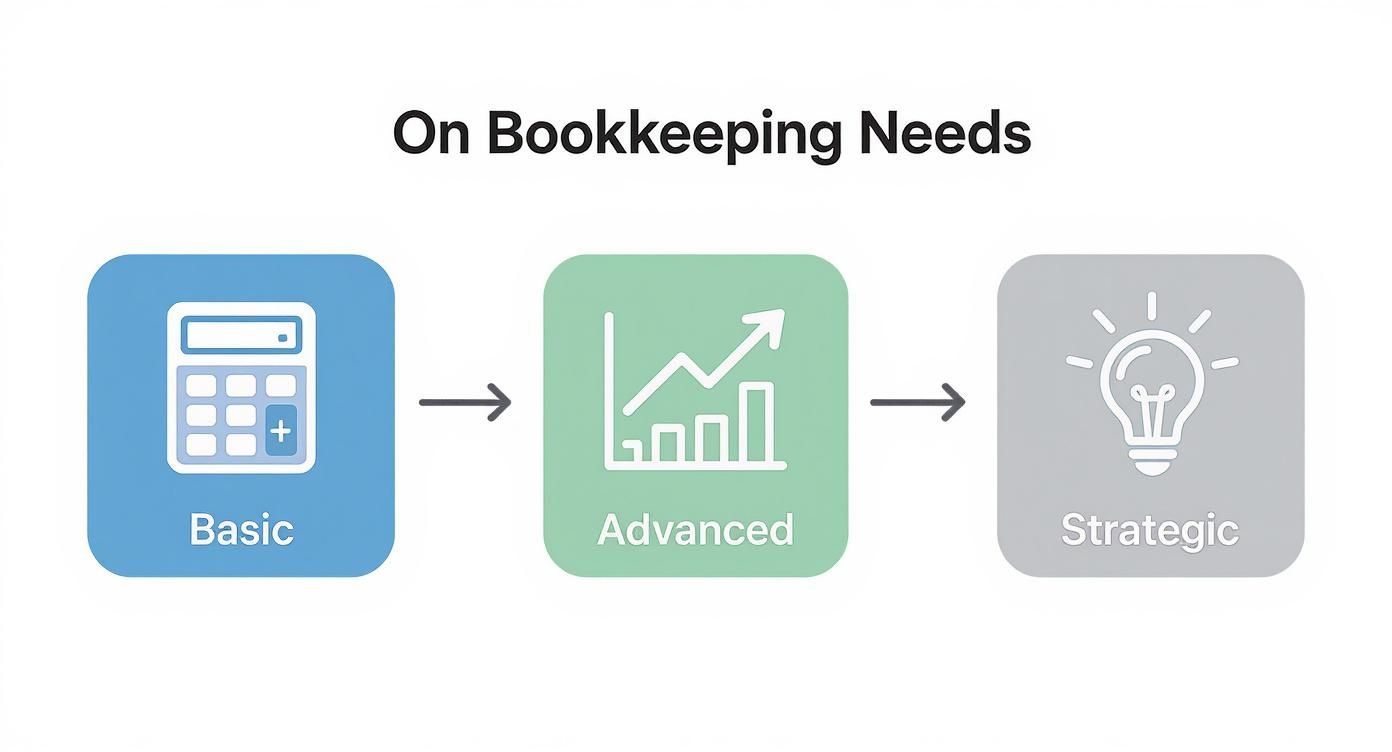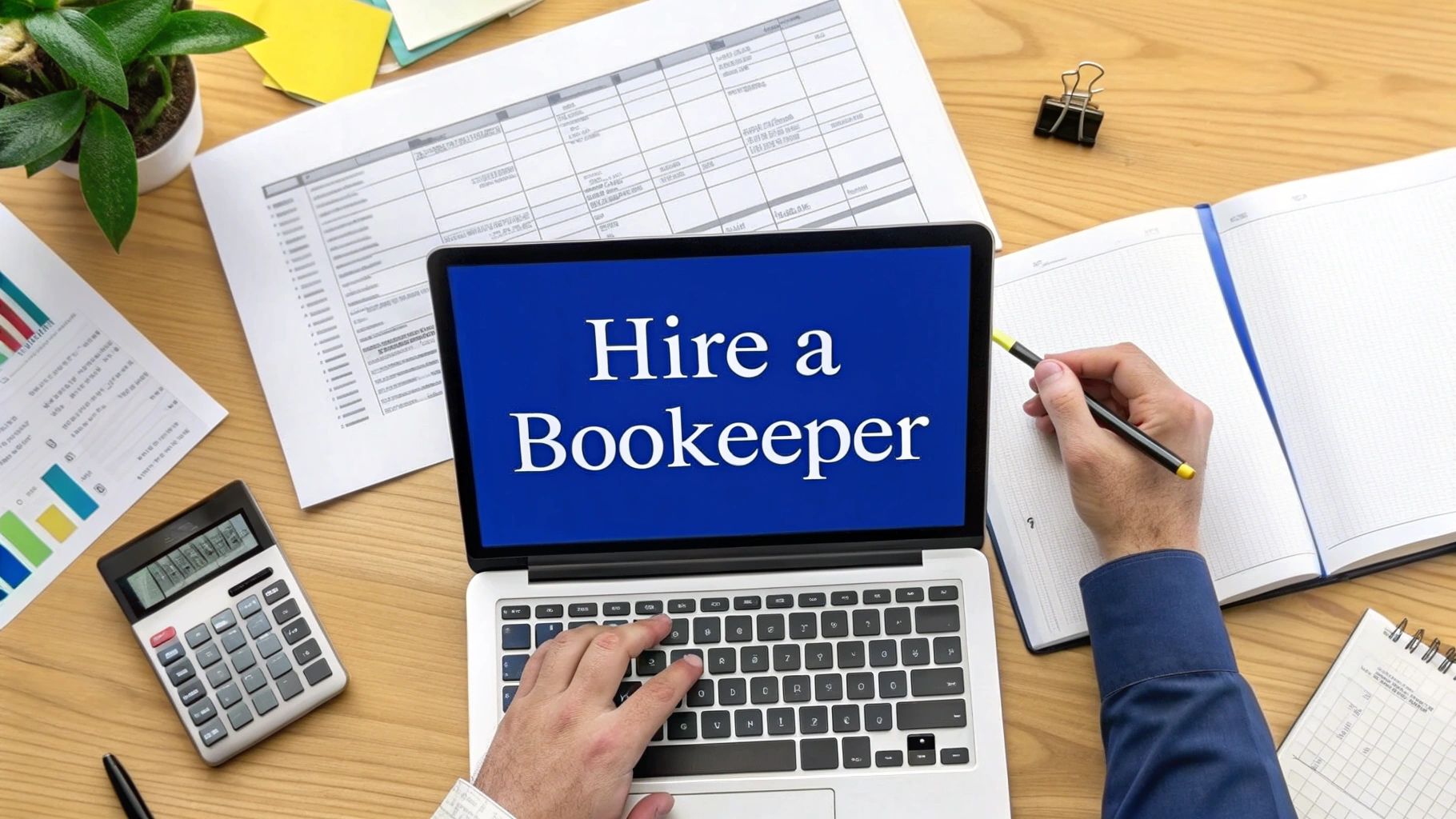Before you even dream of writing a job post, the first, most crucial step is to get crystal clear on what your business actually needs from a bookkeeper. Nailing this down from the start means you attract people who are a genuine fit, saving you from the expense of someone overqualified or the headache of someone underprepared.
Pinpointing Your Exact Bookkeeping Needs
Diving into the hiring process without a clear scope is like setting sail without a map. You might find someone, sure, but they may not be the right person to navigate your company's unique financial waters. Defining your needs isn't just about "doing the books"; it’s about understanding the specific complexity and sheer volume of your financial transactions to find the perfect level of support.
Think about it: a freelance graphic designer sending out ten invoices a month has completely different needs than a growing e-commerce store juggling hundreds of daily transactions, complex inventory, and VAT returns. The designer might just need a few hours of basic data entry each month. The online retailer, on the other hand, requires a much more experienced hand to keep things running smoothly.
Assess Your Transaction Volume and Complexity
The best place to start is by getting a real, hard number on your financial activity. Don't guess. Pull up your bank statements and sales platform reports for the last three months and get counting.
Low Volume/Simple Needs: If you're dealing with fewer than 50 transactions per month, your needs are likely straightforward. This usually involves basic income and expense tracking and a monthly bank reconciliation to make sure everything lines up.
Medium Volume/Growing Needs: Are you in the 50-200 transactions a month range? Your requirements are probably a bit more involved. This often includes running payroll for a small team, managing accounts payable (bills) and receivable (invoices), and pulling together basic financial statements.
High Volume/Complex Needs: Businesses handling over 200 transactions a month are in a different league. This can involve multi-currency transactions, detailed inventory management, project-based accounting, and the need for in-depth financial reports to guide strategic decisions.
This decision tree gives a good visual of how bookkeeping responsibilities grow right alongside your business.

The real takeaway here is that as your business scales, the role evolves. It moves from simple record-keeping to providing valuable financial insights that can genuinely steer your company's strategy.
Identify Essential Skills and Software Proficiency
Next up, make a list of your non-negotiables. Does your team live and breathe in Xero? Or is QuickBooks Online your financial hub? A candidate who already has certifications and proven experience with your chosen software will be able to hit the ground running and add value from day one, which slashes training time.
To build a well-rounded list of what to look for, it's worth exploring the common qualifications for a bookkeeper to make sure you cover all your bases.
Here's a common mistake I see all the time: hiring for today's needs instead of planning for tomorrow's growth. If you're aiming to expand your team or launch a new product line in the next year, you need a bookkeeper who can handle that future complexity, not just your current workload.
This forward-thinking approach is critical, especially for the SMEs that form the backbone of the UK's economy. Unlike massive corporations with in-house finance departments, smaller businesses rely heavily on sharp, external expertise. With the UK bookkeeping industry's revenue projected to hit £6.8 billion by 2026, finding the right professional isn't just a task to tick off—it's a serious investment in your company's financial health. You can dig into more data on this at Ibisworld.com.
Finding and Attracting Top Bookkeeping Talent

Alright, you’ve figured out exactly what you need from a bookkeeper. Now for the tricky part: actually finding that person.
If you just throw a post up on a generic job board, you’re asking for a deluge of mismatched CVs. I've seen it happen countless times. To hire a great bookkeeper, you need to be much more deliberate. You have to go where the professionals are.
Start with professional networks. LinkedIn is a goldmine, particularly for finding people who aren't actively scrolling job sites but are open to a better opportunity. It's also worth joining a few UK-based accounting and finance groups. This gives you a direct line to a community of qualified individuals and lets you get a feel for the talent out there.
Crafting a Job Description That Actually Works
Think of your job description as a sales pitch for your company, not just a dull list of tasks. This is your first—and maybe only—chance to convince a great candidate that your business is the right place for them.
Don't just lead with a long bulleted list of responsibilities. Catch their attention by talking about what makes your business unique.
- Talk about your culture: Are you a high-energy tech startup or a more traditional, stable family business? Being honest about the work environment saves everyone time.
- Show them the future: Is there room for this role to grow? Mention opportunities for professional development or taking on more responsibility down the line.
- Flexibility is a superpower: In the current market, offering remote or hybrid work is a huge draw. If you can offer it, shout about it.
The aim is to attract someone who’s looking for a real career move, not just any old nine-to-five. A thoughtfully written description acts as a natural filter, weeding out the wrong people and pulling in those who genuinely fit.
Navigating the UK Hiring Market
The UK’s accountancy job market is always moving, and it can be fiercely competitive. While the overall market ebbs and flows, certain regions are absolute hotspots for finance roles right now.
For instance, London is expected to see a 15% jump in finance vacancies, but the real growth is happening elsewhere. Look at the South West, projected for a massive 47% expansion, and the West Midlands at 29%. Knowing these regional dynamics helps you frame a competitive offer that stands out.
One of the most common mistakes I see business owners make is trying to do it all themselves. They often dismiss specialist recruiters because of the cost, but a good recruiter already has a curated network of vetted candidates and knows the market inside out. They can save you a phenomenal amount of time and stress.
Of course, recruiters aren't the only option. For businesses needing expert support without the hefty price tag, it pays to explore different avenues. You can get a better sense of your options by looking into staffing agencies for accountants.
Ultimately, you need a solid plan for how to source candidates. It’s the only way to build a strong pipeline of people you'd actually want to hire. By pairing a compelling job description with smart, targeted outreach, you'll put yourself in the best position to attract the top-tier talent your business needs to thrive.
How to Run Interviews That Reveal True Skill
https://www.youtube.com/embed/52CdNpvv6Og
A polished CV tells you a story, but it rarely shows you the whole picture. When it comes to hiring a bookkeeper, the interview is your chance to move beyond qualifications on paper and get a real feel for their practical skills and problem-solving abilities. This is where you see how they actually think.
Your vetting process should start long before they sit down for an interview. A quick initial screening call can confirm the non-negotiables you identified earlier. If Xero certification is a dealbreaker, verify it. If you absolutely need someone with experience in the construction industry, make sure they have it. This brief chat can save everyone a huge amount of time down the line.
Going Beyond Standard Questions
Forget tired, generic questions like, "What are your greatest weaknesses?" They only invite rehearsed answers that tell you very little. Your goal is to get a genuine sense of a candidate's competency by using real-world scenarios.
A short, practical skills test is a fantastic way to do this. It doesn't need to be a long, drawn-out exam. Just provide a small sample data set with a few common transactions—maybe an incorrectly categorised expense, a partially paid invoice, and a bank reconciliation with a missing entry. Ask them to walk you through how they would sort it out. Their approach will tell you far more about their attention to detail and technical know-how than any abstract question ever could.
This hands-on approach is more important now than ever. Hiring intentions among UK businesses for finance professionals remain incredibly strong, with 58% of hiring managers planning to expand their permanent teams in the first half of 2025. This demand is driven by new regulations and the need for solid digital skills, making it crucial to verify a candidate's real capabilities. You can find more insights on how UK finance roles are evolving in this Robert Half report.
Key Bookkeeper Interview Questions
When the interview begins, frame your questions to get candidates talking about their past experiences. This competency-based approach helps you assess how they've handled real challenges, not just how they think they would.
A candidate’s ability to clearly explain a complex financial discrepancy is a massive green flag. If they can make the complicated seem simple, they’ll be an invaluable asset when you need to understand your own business's finances.
To help you get started, here are a few powerful questions designed to assess specific skills.
Key Bookkeeper Interview Questions
Asking these types of questions helps you build a much clearer, three-dimensional view of each person you speak to. Remember, you're not just hiring someone to crunch numbers; you're looking for a professional who will be a guardian of your company's financial accuracy. Their answers should give you the confidence you need to make the right choice.
Making a Confident Hire and Competitive Offer

You’ve gone through the interviews, and one candidate has clearly stood out. They’ve got the skills on paper and the right attitude in person. Now comes the crucial final stage: turning that promising candidate into your new bookkeeper.
It’s tempting to rush this part, but that's a common misstep. The final checks and the offer itself are just as important as the interviews. Taking your time here ensures you’re not just filling a seat, but making a hire you can truly be confident in for the long haul.
Verifying Skills and Professionalism
Don't treat reference checks as a box-ticking exercise. This is your opportunity to get a real-world perspective on how your candidate performs day-to-day. When you get a previous manager on the phone, you want to move past the generic questions.
Try to dig a bit deeper with questions that reveal their true working style:
- On reliability: "How did they cope with deadlines during your busiest times, like year-end?"
- On accuracy: "Can you recall a time they spotted an error that others might have missed?"
- On communication: "How would you describe their ability to explain financial details to someone without a finance background?"
The answers to these questions will give you a much richer picture than a CV ever could. For roles with financial responsibility, it's also worth understanding background checks in the UK. It's an essential part of due diligence, confirming you're placing trust in the right person.
Crafting an Irresistible Offer
With all your checks cleared, it’s time to put together an offer that makes your top choice want to say "yes" immediately. In today's market, a weak or vague offer can mean losing a great candidate to a competitor. Your goals here are clarity and competitiveness.
First, do your homework on salary. Use sites like Glassdoor or check LinkedIn to see what the going rate is for a bookkeeper with this person's experience in your area. You need to be in the right ballpark.
Think of the offer letter as your new hire’s first official welcome. A professional, detailed offer shows you're organised and serious about bringing them on board. It sets a positive tone right from the start.
Make sure the offer letter is crystal clear and lays everything out. Don't leave room for ambiguity.
- Base Salary: State the figure clearly, whether it's annual or hourly.
- Working Hours: Define the core hours and any flexible or remote working arrangements.
- Benefits Package: List the important stuff—pension details, holiday allowance, and any other perks like health insurance or training budgets.
- Proposed Start Date: Give them a clear date to work towards.
A well-structured and attractive offer not only secures your candidate but also starts your working relationship on a foundation of respect and transparency. It’s the final, and most important, step in a successful hiring process.
You’ve done it. The contract is signed, and you’ve found your new bookkeeper. It’s tempting to sit back and relax, but the job isn't quite over. In fact, what you do in these first few days and weeks is crucial. It’s the difference between a good hire and a great, long-term asset to your business.
A chaotic start just leads to confusion and slows everything down. But a well-thought-out onboarding process? That empowers your new bookkeeper to hit the ground running and builds a solid foundation for your working relationship from the get-go.
Setting Up Your New Bookkeeper for Success
Let's get practical. Before your bookkeeper can start making sense of your finances, they need the right tools and access. The goal here is to get them everything they need to work efficiently, without having to chase you for passwords and permissions every five minutes.
The First-Week Technical Checklist
Think about what they'll need on day one. Have a plan to grant them access to all your essential systems straight away.
- Accounting Software: Create a user profile for them in your main platform, whether it’s Xero or QuickBooks. Critically, check that their permission levels match their role – you don't want to give them more or less access than they actually need.
- Bank Feeds and Statements: For reconciliations, they’ll need read-only access to your business bank and credit card accounts. This is a standard part of the process.
- Historical Data: Get all your previous financial records in order. Think past VAT returns, old payroll reports, and year-end accounts. This historical context is absolutely vital for them to understand the full picture of your business.
Getting this initial setup right isn't just about ticking boxes. It’s the first real step in building a transparent and trusting partnership. For a more in-depth plan, our complete new employee onboarding checklist can guide you through their entire first month.
Building Communication and Integration
Beyond the logins and software, there's the human side of things. This is just as important, especially when you hire a bookkeeper who might be working remotely. Taking the time to integrate them into your team prevents them from operating in a silo and keeps everyone on the same page.
Start with simple introductions. Let them know who the key people are they'll be dealing with. This might be you for high-level questions, or perhaps an operations manager who approves invoices. A quick introductory email or a brief video call can make all the difference in making them feel part of the team.
I can't stress this enough: set up a regular check-in schedule from day one. A quick 15-minute call at the end of their first week, followed by weekly or fortnightly meetings, gives you both a dedicated time to ask questions, review progress, and flag any financial oddities they might have spotted.
Finally, be clear about how you prefer to communicate. Is email for formal reports? Should they use a chat tool like Slack for quick questions? Maybe a project management tool like Asana for tracking tasks? Defining these rules of engagement early on prevents a world of frustration and ensures a smooth workflow. A strong start isn't an accident; it’s the result of a deliberate plan that sets your new hire—and your business—up for long-term success.
Got Questions About Hiring a Bookkeeper? Let's Clear Things Up.

If you’re hiring a bookkeeper for the first time, it’s natural to have a few questions swirling around. Getting clear answers is the key to moving forward confidently and making a smart choice for your company's finances.
Here, I'll tackle the most common queries I hear from UK business owners, offering some straight-to-the-point advice to help you get it right.
How Much Does a UK Bookkeeper Actually Cost?
Let's get straight to it: the cost. This is usually the first thing on everyone's mind. In the UK, the price tag can really swing depending on their experience, where you're based, and how you hire them.
A freelance bookkeeper, for instance, typically charges between £25 and £50 per hour. This is a brilliant route to take if your workload varies or you're not quite ready to commit to a permanent staff member.
If you’re thinking about a part-time employee, you're likely looking at an annual salary in the ballpark of £15,000 to £25,000. For a seasoned, full-time professional, especially in a major city like London, that figure will often push past £30,000. My advice? Always have a quick look at the current market rates in your area to make sure your offer is competitive.
What Qualifications Should I Be Looking For?
While nothing beats hands-on experience, formal qualifications are a great indicator of a solid foundation.
- Professional Bodies: Keep an eye out for credentials from well-respected UK organisations. Think the Association of Accounting Technicians (AAT) or the Institute of Certified Bookkeepers (ICB). These show a commitment to the profession.
- Software Skills: This is a big one. A candidate who is already a Xero Certified Advisor or a QuickBooks ProAdvisor can hit the ground running and start adding value from day one, without you having to pay for their training.
- Industry Experience: Never underestimate the value of someone who already speaks your language. A bookkeeper who understands the quirks of your industry—whether it's construction, retail, or tech—will have a much smoother ride getting up to speed.
The real sweet spot is finding someone who has that perfect blend of formal training and practical, relevant experience in your field. I've seen businesses struggle when they hire someone with one but not the other; you either get theoretical knowledge without practical application, or someone who knows the 'how' but not the 'why'.
Bookkeeper vs. Accountant – Do I Really Need Both?
This is a classic point of confusion. The simple answer is that they are two different but complementary roles, and as your business grows, you'll almost certainly need both.
Think of your bookkeeper as the guardian of your day-to-day finances. They're in the trenches, recording transactions, reconciling your bank accounts, chasing invoices, and running payroll. Their job is to keep your financial data accurate and perfectly up-to-date.
Your accountant, on the other hand, takes that clean data and uses it for high-level financial strategy. They’re focused on the bigger picture: tax planning, preparing official year-end accounts, and giving you the strategic advice you need to grow your business. The bookkeeper builds the solid foundation, and the accountant uses that foundation to help you build the future.
How Can I Protect My Data With a Remote Bookkeeper?
Trust is absolutely vital when handing over your financial keys, especially with someone working remotely. Thankfully, modern tech and a few simple agreements make it easy to keep your sensitive information locked down.
First off, always use reputable, cloud-based accounting software that gives you control over user permissions. This way, you can grant your bookkeeper access only to the specific areas they need. A signed Non-Disclosure Agreement (NDA) is also completely non-negotiable; it's your legal safety net.
Finally, don't skimp on the reference checks during the hiring process. A few thorough conversations with past employers will give you peace of mind that you're bringing on a true professional.

